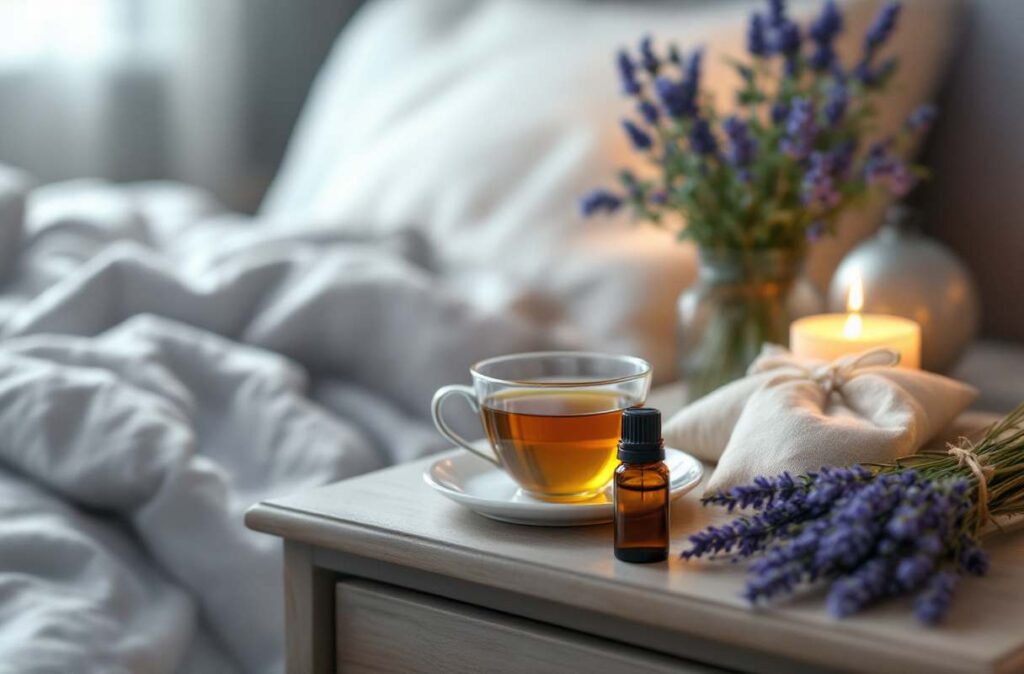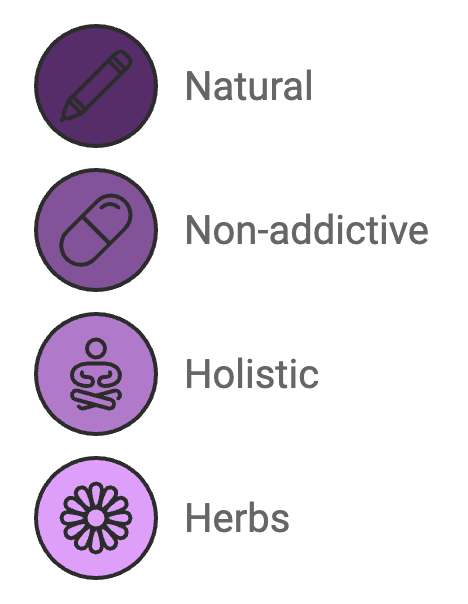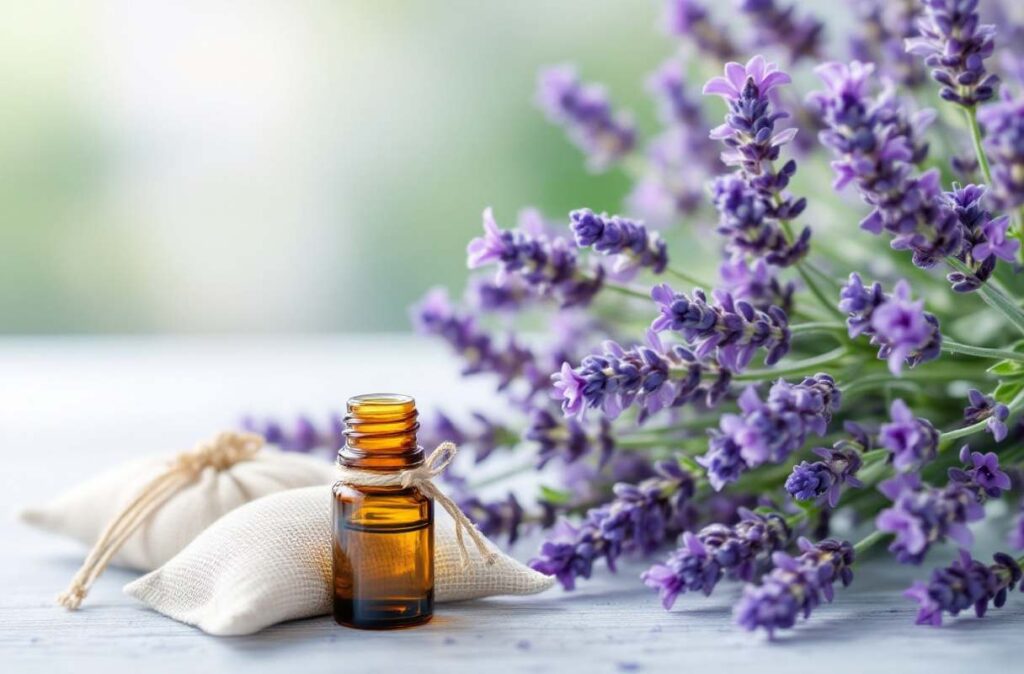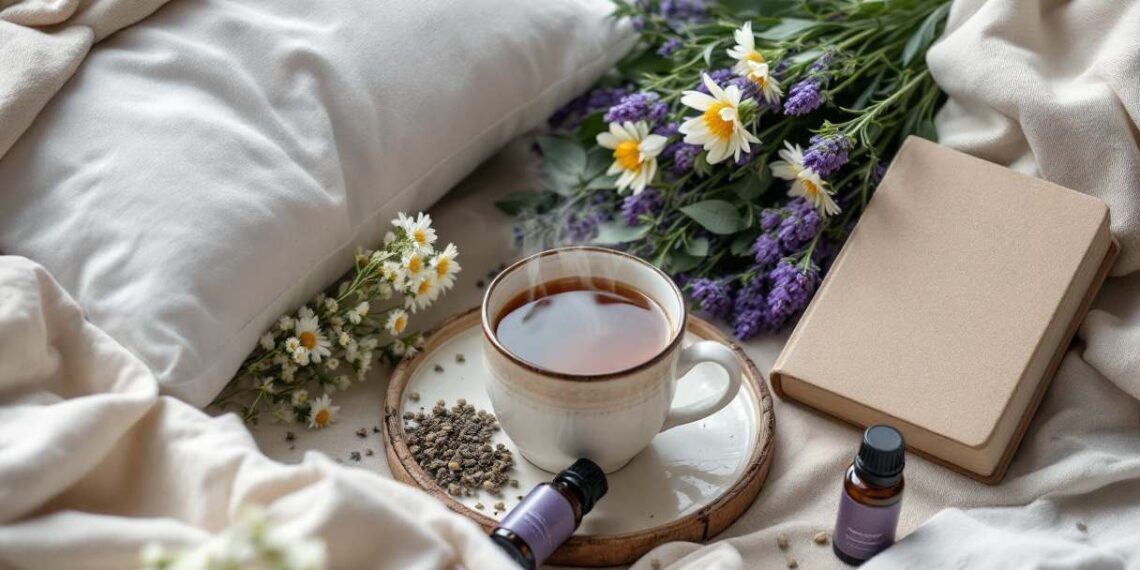Tossing and turning night after night? Before you reach for that bottle of sleep aids, consider nature’s own pharmacy. For centuries, people across the globe have turned to the gentle power of herbs to usher in a peaceful night’s rest. From the soothing scent of lavender to the calming effects of chamomile, these botanical wonders offer a natural pathway to dreamland. In our fast-paced world, where sleep often eludes us, herbs present a time-tested, holistic approach to achieving those coveted zzz’s. Let’s embark on a journey through the lush garden of herbal sleep remedies and discover how these green allies might just be the key to unlocking your best night’s sleep yet.
Understanding the Power of Herbs for Sleep
Ready to conk out naturally? Herbs have been the secret weapon of sleepers around the globe for ages. Let’s uncover how these nature’s gems might just be what you need for some sweet zzz’s.

Natural Alternatives to Improve Sleep
Tired of popping pills that leave you groggy? Herbs could be your ticket to dreamland without the synthetic shebang. Each herb has its own charm, promising a unique snooze-inducing effect. Here’s the rundown:
| Herb | Snooze Benefit |
|---|---|
| Lavender | Zens you out like a cozy blanket |
| Chamomile | Whispers “shhh” to your worries |
| Valerian Root | Sends Sandman your way fast |
| Passionflower | Chills out those racing thoughts |
| Lemon Balm | Adds extra fluff to your fluffy pillow |
| Ashwagandha | Eases the mind for a chill night |
You can brew them, drop them, or inhale their lovely scent. Create your snooze kit and find your herbal hero.
“Nature itself is the best physician.” – Hippocrates
Benefits of Using Herbs for Better Sleep
Going herbal isn’t just trendy; it’s smart. Here’s why these greens are gold for sleep:
- Zero dependency: Say goodbye to worrying about forming a habit.
- Straight from Mother Earth: Keeps things au naturel.
- Blend them into life: Sip on teas, smudge in essential oils, or sneak them in at night. Find out more on aromatherapy sleep perks.
- Perfect partners: Combine with yoga magic moves for snooze or breathe easy techniques.
Adding herbs to your nightly routine isn’t just grounding: it’s relaxing. Sleep better by going natural and discovering ways to enhance your sleep game with herbs and more tips.

“The art of healing comes from nature, not from the physician.” – Paracelsus
Keep snoozin’.
Lavender
Lavender’s your go-to buddy for catching some z’s when you’re tossing and turning. Its comforting scent and mellow vibes are like a lullaby for anyone hoping to sleep better, naturally.
How Lavender Promotes Sleep
Lavender works its magic by helping you chill out and snooze deeper. Its scent lowers your heart rate, eases blood pressure, and kicks stress hormones to the curb. It’s like giving your body a nudge toward dreamland.
Studies say lavender can help you hit all the right sleep stages, giving you longer, more refreshing snooze sessions. It’s perfect for health nuts, parents craving peaceful nights, and night owls who need to catch some winks during the day.
| Benefit | Effect |
|---|---|
| Reduces anxiety | Evokes calmness and peace |
| Lowers heart rate | Promotes a slower physiological response |
| Improves sleep quality | Supports restful and restorative sleep cycles |
Different Ways to Use Lavender for Better Sleep
Trying to fit lavender into your nighttime routine? There are quite a few ways you can bring this tiny flowering friend into the mix. Here’s how you can use lavender for a cozy sleep:
| Method | Description |
|---|---|
| Lavender essential oil | Use a diffuser to let lavender oil simmer around your room – it’s like hitting a chill switch. For more tips, check out essential oils for sleep. |
| Lavender sachets | Tuck dried lavender sachets under your pillow to keep the fragrance wafting all night long. |
| Lavender tea | A warm cup of lavender tea before bed is like a hug in a mug! Peek at our homemade tea for sleep for some cool recipes. |
| Bath with lavender | A bath with a splash of lavender oil or a handful of dried sprigs turns your tub time into a spa moment. |
| Aromatherapy pillow spray | Give your pillow a few squirts of lavender mist for an ultra-soothing sleep spot. Curious about more? Dive into aromatherapy sleep benefits. |
By weaving lavender into bedtime rituals, anyone trying to skip chemical sleep aids can invite a tranquil, natural, and refreshing rest.

Chamomile
The Calming Effects of Chamomile
Chamomile sure knows how to throw a chill-out session. People love it for its ability to help them catch some extra Z’s without reaching for a pill bottle. Thanks to its antioxidants, especially apigenin, this little flower works like a charm, attaching itself to brain receptors that are all about relaxation. Great news for folks wrestling with tossing and turning or feeling a little on edge—chamomile can swoop in like a bedtime superhero, easing anxiety and making sleep less of an elusive dream.
But here’s the kicker: it’s not just for grown-ups. Kids can also benefit from its gentle touch, meaning moms and dads can add it to the bedtime arsenal for a family-wide wind-down session.
Incorporating Chamomile into Your Sleep Routine
Chamomile’s like that easy-going friend who always knows how to calm you down, especially when you’re looking to doze off. Getting it into your nightly routine is a piece of cake—or should we say a cup of tea? Steeping some chamomile goodness is as simple as hitting the kettle button.
| Method | Preparation | Best Time |
|---|---|---|
| Chamomile Tea | Throw 1-2 teaspoons of dried chamomile flowers in a cup of hot water for about 5-10 minutes. | Half-hour before you hit the sack |
| Essential Oils | Pop a few drops of chamomile oil in a diffuser or mix with a little carrier oil for your skin. | When you’re winding down or right before bedz |
| Capsules | Check out the dosage details on the package. | 30-60 minutes before lights out |
Feel like getting creative? Mix up your own tea blends with chamomile as the star player. Peek into our homemade tea for sleep for some ideas that’ll have you sipping your way to dreamland.
And don’t forget chamomile essential oil can work wonders when it comes to aromatherapy; check out how to use it for maximum relaxation in our article on aromatherapy sleep benefits.
Bringing chamomile into your nightly shutdown could mean less counting sheep and more restful sleep. Whether you prefer tea, essential oils, or calling it a night with capsules, this herb might just make bedtime your favorite time.
Valerian Root
Valerian root’s a herb with a bit of a reputation for helping folks catch some quality Zs. It’s become the go-to for many due to its chill vibes and knack for enhancing sleep.
How Valerian Root Gets You Snoozing
This plant gem does its thing by tinkering with brain bits. It kicks up the gamma-aminobutyric acid (GABA) levels in your noggin, the stuff that makes you feel like curling up and drifting off. This magic potion may help you nod off easier and keep you from tossing and turning.
Studies say valerian root is a night owl’s new best friend, especially if insomnia’s got you counting sheep. You’ll find yourself dozing off quicker and not waking up at all hours.
| Valerian Root Perk | What’s It Do? |
|---|---|
| Cuts Sleep Delay | Helps you hit the hay faster. |
| Boosts Sleep Mood | Makes your time with the sandman more consistent. |
| Calms the Mind | Eases stress and anxiety, making sleep a tad easier. |
Mixing valerian root into your nightly routine could be your ticket to dreamland. It’s available in stuff like teas, pills, and drops. If you’re the DIY type, valerian tea’s a hit. Check our sage advice on homemade tea for sleep for some crafty ideas.
Dose and Tips for Valerian Root
Before you jump in, let’s chat dosage and some heads-ups. Typically, taking 300 to 600 mg some 30 minutes to a couple of hours before you hit the sack works best.
| Type | What You Should Take |
|---|---|
| Pills | 300 – 600 mg |
| Brew | 2 – 3 grams of dried root steeped in hot water |
| Drops | 20 – 30 drops (see the bottle for more deets) |
Though it’s mostly all good, some folks might feel a bit wonky, like dizziness, a little headache, or a gurgly tummy. Skip mixing valerian with stiff drinks or other sleepy-time stuff since that combo can be too much of a good thing.
Expectant or new moms and those already juggling health stuff should have a word with a doctor before diving into Valerian Island. Playing it safe means a smoother ride with this herb’s sleepy-time allure.
Valerian root’s a solid pick from the grab bag of herbs for better sleep. It can lend a hand if sleep’s been a stranger and you’re looking for a natural fix.
Passionflower
Passionflower isn’t just eye candy with its stunning petals—it’s also a natural chill pill. For centuries, folks have been using it to unwind and catch some Z’s.
Why Passionflower Is Your Chill Buddy
This flower isn’t just a pretty face; it’s got some serious mojo when it comes to mellowing folks out. Thanks to some nifty compounds, passionflower can put your mind at ease and tell anxiety to hit the road. The magic lies in its ability to boost gamma-aminobutyric acid (GABA) levels in the brain; this is like pressing the ‘chill’ button for your noggin! People who’ve tried it say it helps with those pesky sleepless nights and annoying night-wakes.
If you’re looking to dodge sleep meds and go au naturel, this herb might just be the ticket. It’s calm in a cup (or drop or pill, whatever floats your boat).
| Property | What It Does For You |
|---|---|
| Calming | Chills out your brain and soothes those nerves |
| Mild Sedative | Nudges you into a cozy sleep |
| GABA Levels | Gives your nervous system a big, warm hug |
Picking Your Passionflower Potion
Got choices? Oh, definitely. Passionflower comes in forms like teas that you can sip, tinctures that you can drop, and capsules that you can pop. How much you should take? That depends. Here’s a cheat sheet for what each form usually calls for.
| Form | How Much | What’s The Deal? |
|---|---|---|
| Tea | 1-2 cups before hitting the sack | Let it chill in hot water for 10-15 minutes |
| Tincture | 20-30 drops | Mix with water, bottoms up! |
| Capsules | 300-500 mg | Check the package directions first |
Before you jump on the Passionflower train, it’s a good idea to chat with a healthcare pro, especially if you’re dealing with health problems or expecting a mini-you. And if you’re hunting for more tips on getting better shut-eye naturally, check out our piece on how to sleep better naturally.
Lemon Balm
Lemon balm, hanging out in the mint family, is a nifty herb known for its chill vibes, making it a go-to for catching better Z’s.
Lemon Balm for Improved Sleep Quality
Lemon balm’s got skills in easing tension and dialing down stress, which works wonders for sleep. Some studies think lemon balm might tackle those pesky insomnia blues, leaving folks more satisfied with their snooze time. It’s like a friendly brain wave, encouraging relaxation and preparing you for dreamland.
| How Well It Works | What It Does |
|---|---|
| High | Boosts sleep and kicks anxiety’s butt |
| Moderate | Lends a hand with the occasional night owl issue |
| Low | Offers a tiny bit of calm without making much noise |
For anyone on the lookout for something a little more natural to snag better sleep, lemon balm might just be your new bedtime pal. Especially handy if you’ve got jitters or can’t seem to wind down before lights out.
Lemon Balm Infusions and Supplements
There’s no shortage of ways to get lemon balm into your evening groove. Making tea is a classic move. Let’s peek at its many forms and how you can use them:
| Form | Usual Dose | How to Use It |
|---|---|---|
| Dried Leaf | 1 – 2 teaspoons in hot water | Steep 5 – 10 minutes for a cozy tea |
| Tincture | 1 – 2 ml before bed | Stir into water or go straight for it |
| Capsules | 300 – 600 mg, about 30 minutes before bed | Read the label, follow the label |
| Essential Oil | 3 – 5 drops in a diffuser | Let loose in the evening to chill out |
For those wanting to weave lemon balm into their bedtime routine, pairing it with other sleepy-time buddies like meditation techniques or breathing exercises can bump up the benefits. Lemon balm’s scent can also jazz up aromatherapy, setting a serene stage for slumber.
Embracing lemon balm in a bigger approach to sleep can help handle those occasional sleepless nights and boost your nightly recharge. For anyone dabbling in natural sleep aids, lemon balm’s definitely a groovy choice worth trying.
Ashwagandha
The Stress-Relieving Benefits of Ashwagandha
You know those times when stress feels like it’s got a permanent invite to your brain? Enter ashwagandha, your friendly, ancient herbal ally. This little wonder helps your body keep its cool by knocking cortisol, the stress maker, down a peg. Lower cortisol means you might just drift off to dreamland a little easier, which is great news for anyone who finds a good night’s sleep as elusive as a unicorn. Folks wrestling with sleepless nights or hunting for a natural sleep aid usually find ashwagandha to be a trusty sidekick.
Some smarty-pants researchers have found that ashwagandha does more than just chill out stress; it might lend a hand in easing anxiety. This not only cranks up your chill meter but also helps you hug your pillow tighter and snooze deeper. By bringing some order to your stressed-out systems, it becomes a hot favorite for the health-savvy who are all about grabbing those essential Z’s.
| Benefit | What’s in it for you? |
|---|---|
| Lowers the Stress-O-Meter | Tames cortisol, your stress goblin. Watch relaxation soar. |
| Sleep’s BFF | Helps your sleep get all cozy and quality-like. |
| Calms the Jitters | Gently nudges towards mentally cheerful vibes. |
Incorporating Ashwagandha into Sleep Rituals
Wanna let Ashwagandha work its magic in your bedtime habits? Here’s how you can sneak it into the nightly schedule:
Ashwagandha Tea: Whipping up a calming cup of tea with some ashwagandha dusted it feels like a warm hug before bed. Got the urge to make your own brew? Peek into recipes like homemade tea for sleep that sneak in some ashwagandha goodness.
Capsules or Powders: These are the no-fuss options. Pop a pill or stir a scoop of powder with your night drink. Look out for dosages usually hanging around 300mg to 500mg before bed. For more on this, check the best natural sleep supplements page.
Aromatherapy: Grab ashwagandha essential oil to take your nightly aroma game up a notch. It’ll turn your space into a peace palace. Dive into aromatherapy sleep benefits to find ways to zen-out your zen zone.
Mindful Practices: Pair ashwagandha with relaxing moves like sleep meditation techniques or some chill breathing exercises for sleep. Together, they pack a powerful calming punch.
Herbal Tag Team: Mix ashwagandha with sleep heroes like chamomile or lemon balm. This power pack delivers a knockout punch to sleeplessness. Curious minds might want to browse traditional sleep remedies or best herbal tea for sleep for extra ideas.
By adding ashwagandha into your sleep shenanigans, you’re not just lowering stress and upping sleep quality—you’re crafting a more serene night haven. A win-win, right?
Conclusion
As we’ve explored, the world of herbal sleep aids is rich and diverse, offering a natural alternative to synthetic sleep medications. From the calming embrace of lavender and the gentle nudge of chamomile to the stress-busting powers of ashwagandha, each herb brings its unique benefits to the table. Whether you prefer a soothing cup of tea, the aromatic whisper of essential oils, or the convenience of supplements, there’s an herbal solution waiting to guide you to restful slumber. Remember, the journey to better sleep is personal, and these herbal allies can be powerful tools in crafting your perfect bedtime ritual. By embracing these time-honored remedies, you’re not just chasing better sleep – you’re nurturing a holistic approach to wellness that can transform your nights and energize your days. Sweet dreams await in nature’s sleep sanctuary.
FAQ
- Are herbal sleep remedies safe for everyone?
While generally safe, herbal remedies can interact with medications or have side effects. Always consult with a healthcare professional before starting any new supplement regimen, especially if pregnant, nursing, or taking other medications. - How long does it take for herbal sleep aids to work?
Effects can vary, but many people report improvements within 2-4 weeks of consistent use. Some herbs, like lavender aromatherapy, may have more immediate calming effects. - Can I combine different herbs for sleep?
Yes, many herbs can be safely combined. However, it’s best to start with one at a time to assess individual effects and consult an herbalist or healthcare provider for personalized advice. - Are there any side effects of using herbs for sleep?
Side effects are generally mild but can include digestive upset, headaches, or daytime drowsiness. Always start with low doses and monitor your body’s response. - Can I become dependent on herbal sleep aids?
Unlike some pharmaceutical sleep aids, herbal remedies are not typically habit-forming. However, it’s best to use them as part of a comprehensive sleep hygiene plan rather than relying solely on any one method. - How do I choose the best herbal sleep aid for me?
Consider your specific sleep issues, personal preferences (tea vs. supplements), and any existing health conditions. Experimenting with different herbs under professional guidance can help you find the best fit.
Resources
- Sleep Foundation – Natural Sleep Aids:
https://www.sleepfoundation.org/sleep-aids/natural-sleep-aids - American Sleep Association – Herbal Remedies for Insomnia:
https://www.sleepassociation.org/sleep-treatments/herbal-remedies/ - Journal of Clinical Sleep Medicine – Efficacy of Herbal Remedies for Sleep Disorders:
https://jcsm.aasm.org/doi/10.5664/jcsm.7050 - National Institutes of Health (NIH) – Valerian for Sleep: A Systematic Review and Meta-Analysis:
https://www.ncbi.nlm.nih.gov/pmc/articles/PMC4394901/








